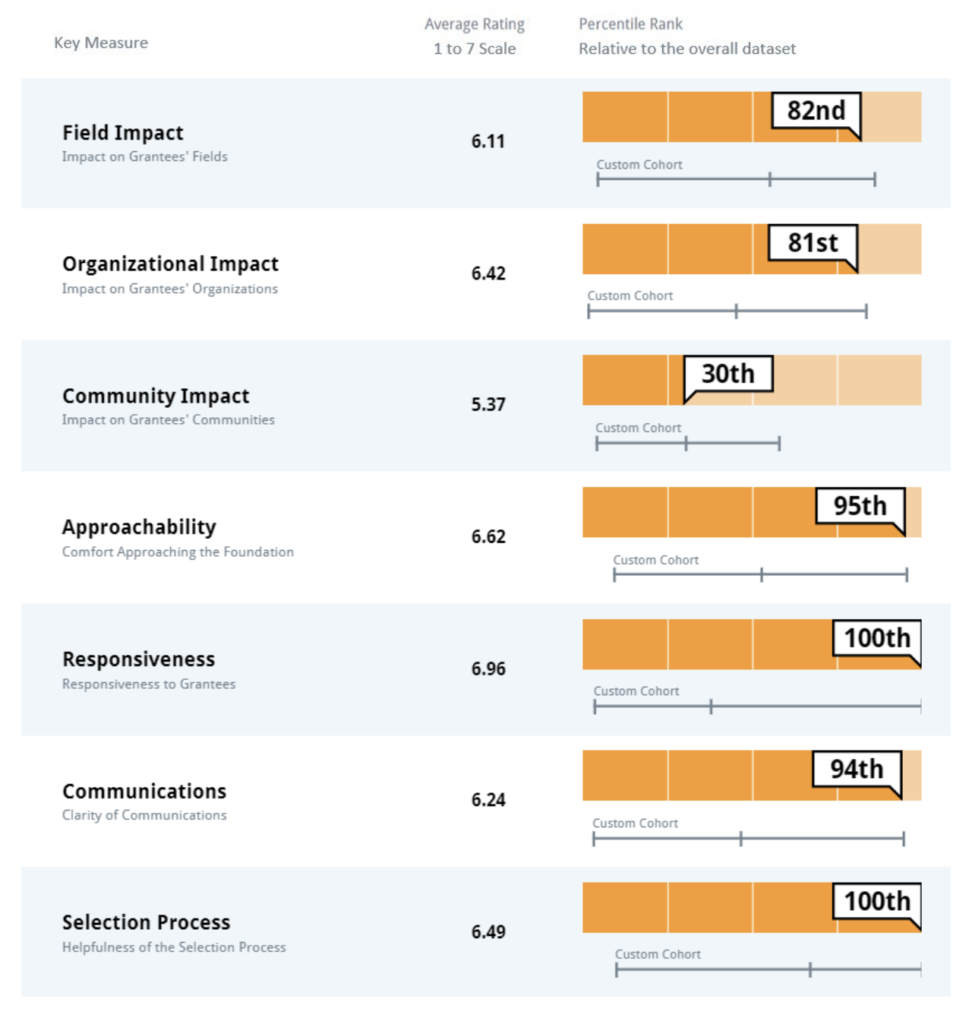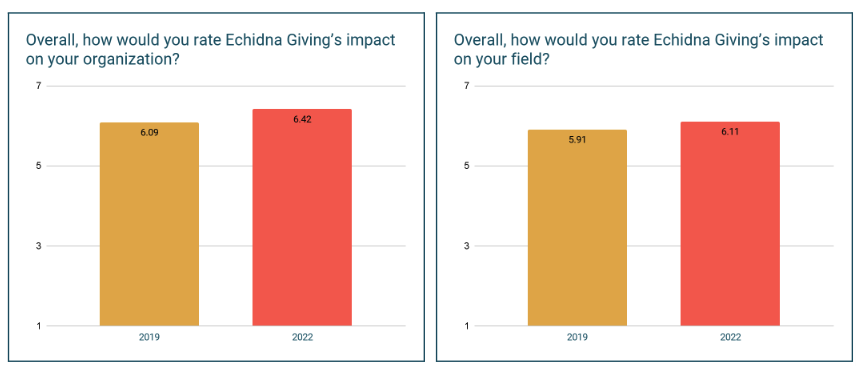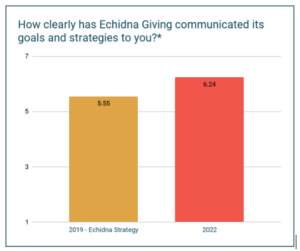Insights: What Grantees Had to Say about Us…And How We’re Using Their Feedback to Improve
/ Dana Schmidt / Insights / October 20, 2022
Thank you to each and every one of the 55 grantee respondents who provided feedback to the Center for Effective Philanthropy about your work with Echidna Giving. This survey is one of the best tools we have for gauging how well we are serving our grantees and, by extension, the broader field. It helps shape what we do and how we do it. Your inputs are invaluable to us and we are incredibly grateful that you took the time to participate.
Sharing back the findings — and what we plan to do with them — is an important part of the process.
First, let me return briefly to what we heard when we last surveyed grantees at the end of 2019. You can read more about those results here, but in summary we identified five things we wanted to work towards:
- Retaining the responsive, respectful, flexible, and supportive interactions that we had with grantees.
- Maintaining our positive impact on the field of girls’ education while intensifying our work in thought leadership and making connections for grantees.
- Offering more support for grantees’ organizational development.
- Adopting a grant management system and workflow that struck the right balance between maintaining flexibility and providing grantees with clarity around what we need and when.
- More intentionally sharing with grantees our strategy and where they fit within it.
So, how did we do?
The Center for Effective Philanthropy aggregates survey results across five key areas. Echidna Giving’s results are conveyed in the table below, as compared with the entire CEP database as well as a custom cohort of funders more similar to Echidna Giving (we picked organizations of a similar size to Echidna Giving who also work in the international development space).
Below the table, we summarize our key takeaways from the survey, as well as how they are influencing our plans for the coming years. We are also including links to CEP’s summary and detailed findings on Echidna Giving.

We have retained strong, supportive relationships with our grantees.
What we were most gratified to see in the survey results is that the types of relationships we strive to establish — relationships based on understanding, open communications, and trust — are felt by grantees. Grantees described Echidna Giving staff as “transparent, friendly, constructive,” and “clear and flexible,” and see our relationship as “trust-based.”
We see these types of relationships as crucial for making the work enjoyable and meaningful, for enabling grantees to be successful, and for modeling the type of world we want to live in.
Grantees believe we are making a difference for their organizations and for the field — and would like us to expand non-monetary support even more.
Our scores in these areas have gone up slightly since the last survey.

When it comes to field-wide impact, Echidna Giving was especially acknowledged for its role in advancing knowledge in the field and serving as a “knowledge leader.”
When it comes to support for organizations, the most consistent suggestions offered for how Echidna Giving could improve related to providing “non-monetary” support, which includes things like making introductions, providing advice (when asked) about strategic or organizational issues, offering referrals to other funders, etc. One common theme was that twelve respondents requested that we facilitate more collaboration and learning between grantees.
Since the last survey, we rolled out a grants management system and started doing an “orientation” session with new grantees. These processes seem to be working for grantees.
We have made a couple of big changes since we last surveyed grantees. For starters, we rolled out our first online grant management system — with some trepidation that this might be a nuisance for grantees. We were relieved to see that this system is working well, that, if anything, our reporting process has become more straightforward and grantees rate us exceptionally well for our selection process.
The second change was made in direct response to our last survey, when it was clear that not all of our grantees had a strong understanding of our strategy. Since then, with each new grantee we have walked through our strategy, where their work fits within it, and tips and tools for interacting with the Echidna Giving team over the course of the grant.
As a result, we have seen about a 10% improvement on this score. We also noticed that when we disaggregated grantee data by length of relationship with Echidna Giving, some of our longer term grantees did not have an equally strong understanding of how they were situated within our portfolio. We can improve on this in the years to come.

We will focus on three areas for improvement in the years to come.
Our team is incredibly proud of the work that we do, and gratified by these findings. We are reminded of how privileged we are to do this work — and our great responsibility is to continue to do it well. Here are three things we will work on in the years to come:
- Articulate which aspects of Echidna Giving’s values, systems, and structures are contributing to grantees’ strong positive experiences and work to ensure these strengths are reinforced over time. Echidna Giving is a relatively young organization with a relatively small team. In some ways, that makes it easier to achieve positive results — it is simpler to influence good practice and remain nimble across a small team. As we grow both our portfolio and our staff numbers in the coming years, we need to find ways to articulate and share the practices and mindsets that have allowed us to achieve these results. We will start by documenting our organizational principles and sharing this internally and externally with other funders and all of you, our grantee partners. We will also maintain and even expand the practices that are working — including by offering our new grantee orientation to longer-term grantees who were onboarded before we developed this practice and providing grantees with updates on our grantmaking strategy as it continues to evolve and expand in the years to come.
- Consider whether and how impacting grantees’ local communities should become a priority. This is the one area where Echidna Giving scores below the 80th percentile in CEP’s survey. On the one hand, this is unsurprising given our work is oriented internationally, and funders working internationally tend to score lower in this domain. Although these low scores are not necessarily a large concern at this time, we do plan to examine whether our expansion in the coming years will offer opportunities to bring a sharper local lens to our work.
- Build on Echidna Giving’s strong practice of providing non-monetary assistance to grantees and consider expanding support. We will continue to provide informal “office hour” check-ins and brainstorming conversations, make connections to other funders, and share resources with our grantees. In tandem, we will work to gather more information to understand the types of grantee collaborations and convenings Echidna might facilitate that could be useful to grantees or the field (without burdening grantees with the feeling there is yet one more meeting they must attend, on behalf of a funder).
We’ll check back in with grantees in three years to see how we are doing through another formal grantee survey. However, building strong relationships is a two-way street and we hope and want grantees to continually share with us how we can support them best and what we can be doing better. We look forward to keeping this conversation going!
